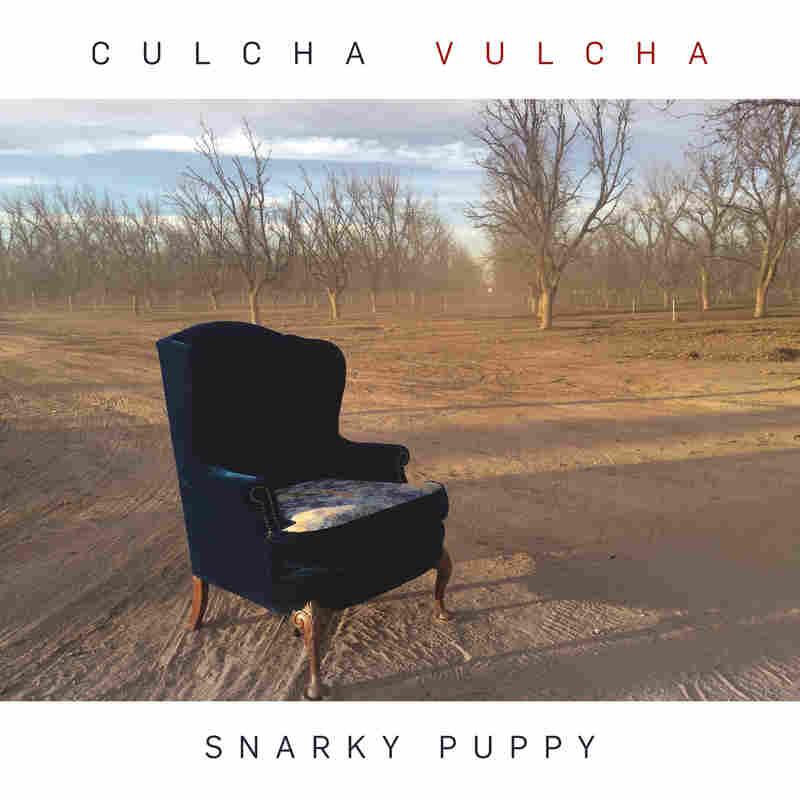CD: Snarky Puppy – Culcha Vulcha | reviews, news & interviews
CD: Snarky Puppy – Culcha Vulcha
CD: Snarky Puppy – Culcha Vulcha
Renowned fusioneers give themselves studio space to play

Snarky Puppy make music on their own terms. Boundary-straddling is their stock in trade, from their origins between Brooklyn and Texas, their technique comprising complex orchestration and individual improv, an expansive approach to genre that spans spiky experimental to the seediest lounge-funk, and an aesthetic that’s heavily amplified but flavoured with horn-driven acoustic sound.
After a series of Family Dinner albums that flouted their eclecticism with guest appearances from world music, gospel and blues stars including Lalah Hathaway, Salif Keita and Laura Mvula, for this, their 11th album and first studio album in eight years, they retreated to an isolated Texan recording studio, and have created an original album of darker, intensely experimental and introspective music. The tricksy, addictive jazz-funk fusion is immediately recognisable, but there’s less showmanship than on their live albums, while the sparks from their creative forge come through bright and loud. The big-stage energy that characterises their live performances becomes a slow-burn stew of playfully fused influences, diverse in origin but united by a slick, big-band funkiness.
The intellectual heat of composition is most evident in the choppy rhythm of “Grown Folks” or the sizzling energy of “Palermo”, while the cinematic space of the Texan landscape emerges in “Big Ugly”, a moody portrait of epic horizons. The band’s homage to smoky funk electronica smoulders through “Beep Box” and “Gemini”, while some of the crowd-pleasing melodic invention familiar from the live releases wafts through two of the less intense tracks, “Servente” and “Go”. Acoustic brass blurs to trancey electronica on “Palermo” and “Grown Folks” – for me, the stand-outs – while the more cerebral opportunities of the studio show Michael League’s Grammy-winners briefly leaving jazz-funk for a more spacey electronica. Occasionally, with the studio freedom, comes a sense of experimentation for its own sake, but listeners who appreciate the band’s attempts to keep a foot in four or five musical camps simultaneously will enjoy this more intense stage of their musical journey.
rating
Share this article
The future of Arts Journalism
You can stop theartsdesk.com closing!
We urgently need financing to survive. Our fundraising drive has thus far raised £49,000 but we need to reach £100,000 or we will be forced to close. Please contribute here: https://gofund.me/c3f6033d
And if you can forward this information to anyone who might assist, we’d be grateful.

Subscribe to theartsdesk.com
Thank you for continuing to read our work on theartsdesk.com. For unlimited access to every article in its entirety, including our archive of more than 15,000 pieces, we're asking for £5 per month or £40 per year. We feel it's a very good deal, and hope you do too.
To take a subscription now simply click here.
And if you're looking for that extra gift for a friend or family member, why not treat them to a theartsdesk.com gift subscription?
more New music
 Album: Ethel Cain - Willoughby Tucker, I'll Always Love You
Relatively straightforward songs from the Southern Gothic star - with the emphasis on 'relatively'
Album: Ethel Cain - Willoughby Tucker, I'll Always Love You
Relatively straightforward songs from the Southern Gothic star - with the emphasis on 'relatively'
 Album: Black Honey - Soak
South Coast band return with another set of catchy, confident indie-rockin'
Album: Black Honey - Soak
South Coast band return with another set of catchy, confident indie-rockin'
 Album: Molly Tuttle - So Long Little Miss Sunshine
The US bluegrass queen makes a sally into Swift-tinted pop-country stylings
Album: Molly Tuttle - So Long Little Miss Sunshine
The US bluegrass queen makes a sally into Swift-tinted pop-country stylings
 Music Reissues Weekly: Chip Shop Pop - The Sound of Denmark Street 1970-1975
Saint Etienne's Bob Stanley digs into British studio pop from the early Seventies
Music Reissues Weekly: Chip Shop Pop - The Sound of Denmark Street 1970-1975
Saint Etienne's Bob Stanley digs into British studio pop from the early Seventies
 Album: Mansur Brown - Rihla
Jazz-prog scifi mind movies and personal discipline provide a... complex experience
Album: Mansur Brown - Rihla
Jazz-prog scifi mind movies and personal discipline provide a... complex experience
 Album: Reneé Rapp - Bite Me
Second album from a rising US star is a feast of varied, fruity, forthright pop
Album: Reneé Rapp - Bite Me
Second album from a rising US star is a feast of varied, fruity, forthright pop
 Album: Cian Ducrot - Little Dreaming
Second album for the Irish singer aims for mega mainstream, ends up confused
Album: Cian Ducrot - Little Dreaming
Second album for the Irish singer aims for mega mainstream, ends up confused
 Album: Bonniesongs - Strangest Feeling
Intriguing blend of the abstract, folkiness, grunge and shoegazing from Sydney
Album: Bonniesongs - Strangest Feeling
Intriguing blend of the abstract, folkiness, grunge and shoegazing from Sydney
 Album: Debby Friday - The Starrr of the Queen of Life
Second from Canadian electronic artist and singer offers likeable, varied EDM
Album: Debby Friday - The Starrr of the Queen of Life
Second from Canadian electronic artist and singer offers likeable, varied EDM
 Music Reissues Weekly: The Pale Fountains - The Complete Virgin Years
Liverpool-born, auteur-driven Eighties pop which still sounds fresh
Music Reissues Weekly: The Pale Fountains - The Complete Virgin Years
Liverpool-born, auteur-driven Eighties pop which still sounds fresh
 Album: Indigo de Souza - Precipice
US singer's fourth ups the pop ante but doesn't sacrifice lyrical substance
Album: Indigo de Souza - Precipice
US singer's fourth ups the pop ante but doesn't sacrifice lyrical substance
 Album: Mádé Kuti - Chapter 1: Where Does Happiness Come From?
Lively new album from the third generation of Nigeria's first musical family
Album: Mádé Kuti - Chapter 1: Where Does Happiness Come From?
Lively new album from the third generation of Nigeria's first musical family

Add comment